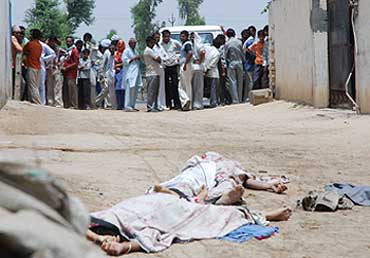Jaswinder Kaur Sidhu, Tina Isa, Hatin Surucu, Vandana Bhadodiya. A Sikh girl from Toronto. A Palestinian girl in the US. A German-Kurdish girl living in Berlin. A Gujarati girl from Vadodara city. Women of different backgrounds, from different countries, of different religious persuasions, yet united by the circumstances of their death. They were all executed by close kin fathers, mothers, uncles, brothers f or the crime of choosing their life partners.
or the crime of choosing their life partners.
But that doesn't mean that young women are killed routinely only for asking for the right to love and marry whom they wish. Sometimes a young woman's life costs less than a song. Take Heshu Yones. Or Ayaman Udas. The former, a 16-year-old teenager from Acton, London, was killed after her family heard a song dedicated to her over the radio. The latter, a poet and singer from Peshawar, was killed by her brothers for performing on PTV, the national television network.
At other times, the reason for death can be as flimsy as a headscarf. Aqsa Parvez, a teenager in Toronto, was killed by her father for refusing to wear one to school. The reason can also be as facetious as an internet chat. An unnamed woman in Riyadh was killed for chatting with a man on Facebook. The ultimate irony is that the murder came to light not because of protests against the killing but because a Saudi cleric protested the corruption of society by social networking sites.
According to UN statistics, over 5,000 women die every year in honour killings. Throughout South Asia and the Middle East, young women carry the cross of upholding family honour. This happens across religions, cultures and social classes. Yes, it happens to Muslim women. But it also happens to Hindu and Sikh ones. Yes, it happens among the poor. But it also happened to Saudi Arabia's Princess Misha'al despite the fact that she was rich and royal.
 The fact that these killings are sanctioned by the cultures in which they occur makes them doubly dangerous. In countries such as Iraq, Syria and Jordan, laws are sympathetic to the killers. Closer home, caste or khap panchayats, operating in large parts of rural Haryana and Uttar Pradesh routinely mete out death penalties to those defying their diktats. Such cases rarely end in convictions as no witnesses are forthcoming. Politicians too remain wary of addressing the issue as cultural sensitivities are involved.
The fact that these killings are sanctioned by the cultures in which they occur makes them doubly dangerous. In countries such as Iraq, Syria and Jordan, laws are sympathetic to the killers. Closer home, caste or khap panchayats, operating in large parts of rural Haryana and Uttar Pradesh routinely mete out death penalties to those defying their diktats. Such cases rarely end in convictions as no witnesses are forthcoming. Politicians too remain wary of addressing the issue as cultural sensitivities are involved.
If we widen the scope of the argument beyond honour killings to other forms of repression and control, it becomes even clearer that young women in our part of the world carry too heavy a burden in the name of family honour. Many communities in India like the Syrian Christians, Parsis and Tamil Brahmins, otherwise associated with high levels of education and attainment, enforce strict rules of endogamy. Girls are generally not free to choose who they marry. All across north India, the word sala (wife's brother) is a common expletive. Consider this: even when the sister is duly married off to a husband chosen by the family in a ceremony presided over by priests and approved by society, her brother doesn't emerge untainted. His dignity is compromised by the fact that the other man sleeps with his sister.
What precisely is the link between a young woman's freedom to choose and her family's honour and why does it go so deep? Feminists attribute it to the patriarchal structure of our societies. The maintenance and perpetuation of human society as we know it, depend in a very large measure on the invisible, unpaid, undervalued and unending jobs done by women - the cooking, feeding, washing, cleaning and breeding services provided by wives and mothers. A young woman is a productive and reproductive asset in the larger scheme of things and she can no more be allowed to take her own decision on who she'll marry than a domesticated cow or horse can determine who it will be milked by or whose cart it will pull.
Islamic cultures are marked by a distrust of female sexuality. In Christianity too, it is Eve who bears the stigma of succumbing to temptation. Likewise, the Hindu text, the Manusmriti, prescribes that "day and night women must be kept in dependence by the males (of) their (families), and if they attach themselves to sensual enjoyments, they must be kept under one's control. Women must particularly be guarded against evil inclinations".
Finally, it all boils down to issues of community identity and hurt male egos. When a girl marries outside, she rejects a man from her own community in favour of a man from another. In the process, she violates norms that have been built up and guarded over centuries to preserve community identity. Her choice further implies a perceived lack in the males of her own community. By crossing over, she becomes enemy property, deserving the harshest of ends, for she is now seen as a traitor.
It is ironical that education and social liberalism have not ameliorated these trends but rather exacerbated them. Technology renders the world smaller each day, bringing traditional and modern lifestyles in tense, unresolved proximity. Dead daughters are simply collateral damage as two disparate worlds collide.
The writer is a novelist. Vandana Bhadodiya , Jaswinder Kaur Sidhu
